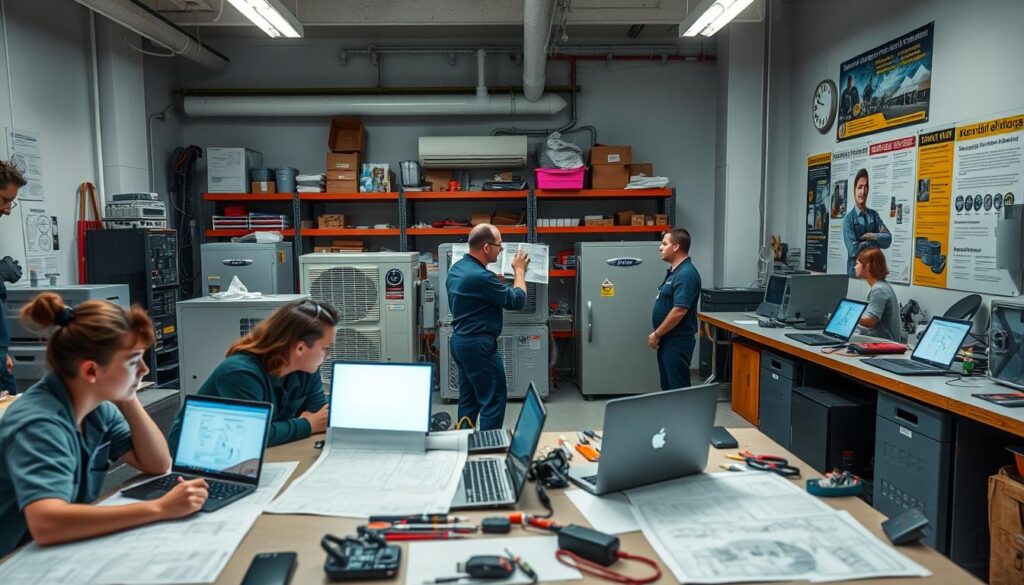Affiliate Disclosure
HVAC Guide Guys is a participant in the Amazon Services LLC Associates Program, an affiliate advertising program designed to provide a means for sites to earn advertising fees by advertising and linking to Amazon.
Are you thinking about an HVAC career? It could be your path to a stable and rewarding job. The HVAC industry is full of exciting opportunities for those ready to learn.

Learning HVAC might seem tough, but it’s doable with the right mindset. There’s a big demand for skilled HVAC technicians in the U.S. Over 650,000 professionals are already working in this field.
To start your HVAC career, first learn the basics. Then, look into training options and develop key technical skills. Whether you just graduated or are looking for a new career, the HVAC industry is open to motivated people.
Key Takeaways
- HVAC offers promising career prospects with competitive starting salaries
- Training programs typically last 1-2 years
- Entry into the field is possible directly after high school
- Potential to earn over $100,000 as a skilled technician
- Growing job market with 15% projected growth by 2026
Table of Contents
Understanding the HVAC Technician Role
HVAC technicians are key to keeping indoor spaces comfy and safe. They make sure heating, ventilation, and air conditioning systems work well. This is true for homes, businesses, and factories.
The job outlook for HVAC techs is bright. Reports say there will be a 13% increase in jobs from 2020 to 2030. This shows more people are needed who can handle complex systems.
Core Responsibilities and Daily Tasks
As an HVAC tech, your day will be filled with various tasks:
- Reading and interpreting technical blueprints
- Installing and maintaining heating and cooling systems
- Testing electrical circuits and connections
- Conducting system performance diagnostics
- Welding and connecting pipe systems
Equipment and Tools Mastery
Being good at HVAC tech means knowing how to use special tools and equipment. You’ll work with:
| Tool Category | Specific Tools |
|---|---|
| Measurement Tools | Voltage testers, refrigerant scales |
| Safety Equipment | Steel-toed boots, safety glasses, hard hats |
| Diagnostic Equipment | Vacuum pumps, electrical meters |
Technical Skills Required
To be a top HVAC tech, you need to master many technical skills. About 90% of training programs mix classroom learning with hands-on practice. This way, you get all the skills you need.
“Understanding thermodynamics and gas laws is foundational for effective HVAC system operation.” – Industry Expert
Key skills include knowing electrical systems, understanding complex mechanics, and using math to solve tough problems.
Explore Our HVAC Shop
Looking for top-rated HVAC tools, parts, and accessories? Visit our shop and find the perfect solution for your needs.
Visit the ShopHow Hard Is It to Learn HVAC
Learning HVAC can be tough but doable for those who are eager to learn. How hard it is depends on several factors. Knowing these can help you see if HVAC is right for you.
Your success in HVAC learning depends on many things:
- Personal technical aptitude
- Prior mathematical and scientific background
- Hands-on learning capabilities
- Commitment to continuous learning
HVAC study materials cover complex topics. They need both theory and practical skills. About 55% of HVAC training programs mix classroom and hands-on training, making sure you learn well.
“Understanding the basics of thermodynamics and electrical systems is key for HVAC mastery,” says industry expert Mark Reynolds.
The learning curve for HVAC varies a lot. Some find the tech hard, while others with physics or math backgrounds get it faster. Studies show that around 70% of HVAC technicians say practical experience boosts their skills and knowledge.
Your learning path will include:
- Basic scientific principles
- Electrical system understanding
- Refrigeration cycle comprehension
- Equipment installation techniques
- Troubleshooting skills
The bright side is that you only need a high school science and math level to start. With hard work and the right program, you can overcome HVAC’s challenges and enjoy a fulfilling career.
Explore Our HVAC Shop
Looking for top-rated HVAC tools, parts, and accessories? Visit our shop and find the perfect solution for your needs.
Visit the ShopEducational Requirements for HVAC Training
Starting an HVAC career needs a clear plan for education and training. First, you must know the key educational steps for a successful career in heating, ventilation, air conditioning, and refrigeration.
High School Diploma Prerequisites
Getting a high school diploma or GED is the first step in HVAC training. Most HVAC programs require this basic credential. Important high school subjects include:
- Mathematics
- Physics
- Computer science
- Mechanical drawing
Technical School Programs
Technical schools provide focused HVAC training. These programs last from 6 to 24 months. They teach you about HVAC systems and technologies.
| Program Type | Duration | Credits Required |
|---|---|---|
| Certificate Program | 9-10 months | 30 credits |
| Associate Degree | 2 years | 60 credits |
Certification Options
Getting professional certifications boosts your HVAC career. Key certifications are:
- EPA Section 608 Technician Certification
- R-410A Certification
- NATE Core Certifications
- OSHA 10-Hour Construction Training
“Invest in your education, and the HVAC industry will invest in you.” – Industry Expert
HVAC education costs vary, from $1,200 to $15,000. This investment can lead to a promising career. The HVAC job market is expected to grow 5% by 2030.
HVAC Training Program Duration and Components
When you think about hvac training, knowing the program structure is key. HVAC courses give you a wide range of learning experiences. They prepare you for a dynamic technical career. These programs last from 6 months to 3 years, depending on your choice.
Your hvac training will cover several key components. These build your technical expertise:
- Diagnostic skills development
- Testing equipment operation
- Mechanical principles
- Electrical system understanding
- Electronic system fundamentals
Different educational paths have unique program durations:
| Program Type | Duration | Key Focus |
|---|---|---|
| Certificate Programs | 6-12 months | Quick entry-level technical skills |
| Diploma Programs | 1 year | Comprehensive practical training |
| Associate Degree | 2-3 years | In-depth technical education |
| Apprenticeship | 3-5 years | Hands-on professional experience |
“Continuous learning is the key to success in the HVAC industry.” – HVAC Industry Expert
Your chosen program will mix theory with practical skills. This ensures you’re ready for real-world HVAC challenges. Remember, staying updated with new technologies is vital in this changing field.
Explore Our HVAC Shop
Looking for top-rated HVAC tools, parts, and accessories? Visit our shop and find the perfect solution for your needs.
Visit the ShopEssential Skills for Success in HVAC
To start a successful HVAC career, you need technical skills, physical strength, and problem-solving skills. The best HVAC technicians have a mix of these skills. They excel in this fast-paced field.
Being good at HVAC means having a wide range of skills. Your success in HVAC depends on several key traits:
Technical Aptitude
Technical skills are the base of a good HVAC career. You must be good at several important things:
- Understanding complex electrical and mechanical systems
- Reading and interpreting technical blueprints and schematics
- Diagnosing complex equipment problems
- Using advanced tools like ServiceTitan
Physical Requirements
HVAC work needs a lot of physical strength. You’ll have to:
- Lift heavy equipment up to 50 pounds
- Work in tough places like attics and crawl spaces
- Stay physically strong for many service calls a day
- Do tasks in different weather
Problem-Solving Abilities
Great problem-solving skills make a technician stand out. You should be able to:
- Find unique solutions for different problems
- Think clearly under pressure
- Adjust quickly to changing situations
- Explain complex technical stuff clearly
“85% of HVAC technicians say mechanical aptitude is key for solving tough problems.”
| Skill Category | Key Competencies | Importance |
|---|---|---|
| Technical Skills | Electrical systems knowledge | 90% |
| Physical Abilities | Strength and endurance | 85% |
| Problem-Solving | Adaptability and critical thinking | 95% |
Always keep learning and growing to stay ahead in the HVAC field.
HVAC Apprenticeship Opportunities

Starting your HVAC career through apprenticeships is thrilling. These programs offer a deep dive into the field, teaching you practical skills and professional experience.
HVAC apprenticeships mix learning with hands-on training. This way, you learn important technical skills and earn money. Programs usually last three to five years, covering complex HVAC systems and professional practices.
- Trade schools can get you into the job market in about 6 months
- Many HVAC companies look for people with strong communication skills
- Bigger companies often have more apprenticeship spots
Your HVAC apprenticeship will include:
- Learning technical skills in class
- Getting hands-on training on the job
- Learning about safety protocols
- Seeing the latest in HVAC technology
“Success in HVAC apprenticeships depends not just on technical knowledge, but on developing strong interpersonal and problem-solving skills.”
The best time to look for HVAC jobs is from February to April. This is when companies get ready for the summer rush. Some programs even connect you with local HVAC companies, helping you find a job after you finish.
Keep learning is key in this fast-changing field. Many companies offer weekly training to keep you up-to-date with new HVAC technologies and methods.
Explore Our HVAC Shop
Looking for top-rated HVAC tools, parts, and accessories? Visit our shop and find the perfect solution for your needs.
Visit the ShopCareer Growth and Advancement Paths
Your HVAC career is full of chances for growth and specialization. As you get more experience, you’ll find many ways to move up. This lets you turn your initial hvac certification into a fulfilling career.
The HVAC field has many paths for career growth. Technicians can boost their careers by focusing on special areas and keeping learning.
Specialization Options
Look into many specializations in your hvac career:
- Automotive HVAC Technician
- Refrigeration Specialist
- Energy Efficiency Consultant
- Commercial Systems Expert
- Green Technology Integrator
Professional Development Strategies
To move up in HVAC, you need a plan for growth. Here are some steps:
- Get advanced hvac certification
- Take specialized training programs
- Work on management skills
- Connect with industry pros
“Continuous learning is the key to unlocking career opportunities in the HVAC industry.” – HVAC Industry Expert
The HVAC job market is growing fast. It’s expected to grow by 13% from 2018 to 2028. This is much faster than the average job market growth. Mid-level technicians with 3-6 years of experience and several certifications have great career chances.
Potential Advanced Roles
As you get more experience, think about these top jobs:
- Technical Estimator
- Service Manager
- Project Coordinator
- Training Manager
- Independent Business Owner
Your commitment to improving your skills and learning will be key to a successful HVAC career.
Job Market Outlook and Salary

The HVAC job market is looking very good for those who want to become technicians. It’s expected to grow by 6% from 2022 to 2032. This means there will be lots of stable and exciting jobs all over the United States.
Here are some numbers that show how promising this field is:
- Total HVAC jobs in 2022: 415,800
- Projected annual job openings: 37,700
- Median annual wage: $51,390
Your salary in HVAC can change a lot based on how long you’ve been working and what you specialize in. New technicians usually start at $36,170. More experienced ones can make up to $82,630 a year.
“The HVAC industry offers robust job security with constant demand for skilled technicians.” – Industry Expert
Some places are growing faster than others in the HVAC field:
- Texas: 21% job market growth
- New York: 20% job market growth
- California: 14% job market growth
Getting extra certifications like EPA Technician Certification and North American Technician Excellence (NATE) can help. They make you more attractive to employers and can increase your salary.
Conclusion
Starting an HVAC career is a big decision for those looking for a challenging job. Learning HVAC is a journey that needs hard work, technical skills, and hands-on training. Programs last about 10 months and you need a high school diploma to start.
Your success in HVAC depends on your technical skills, understanding complex systems, and problem-solving. Getting practical experience through training and apprenticeships is key. You’ll also need to pass tough certification exams and get a state license to move up.
Even though HVAC careers have their challenges, they also offer great growth opportunities. There’s a strong demand in homes, businesses, and factories, making it a stable job. By always learning, keeping up with new tech, and improving your skills, you can have a fulfilling career in HVAC.
How hard it is to learn HVAC really depends on your dedication, technical ability, and eagerness to learn more. With the right training, attitude, and effort, an HVAC career can be rewarding and profitable.

